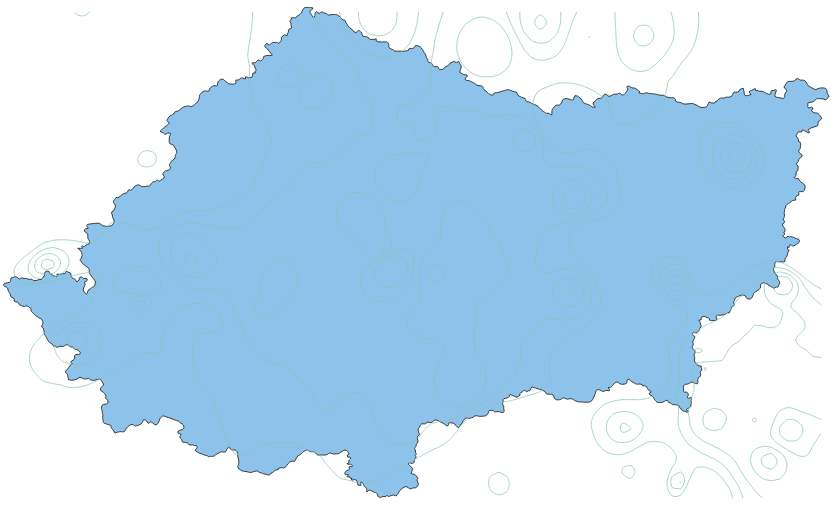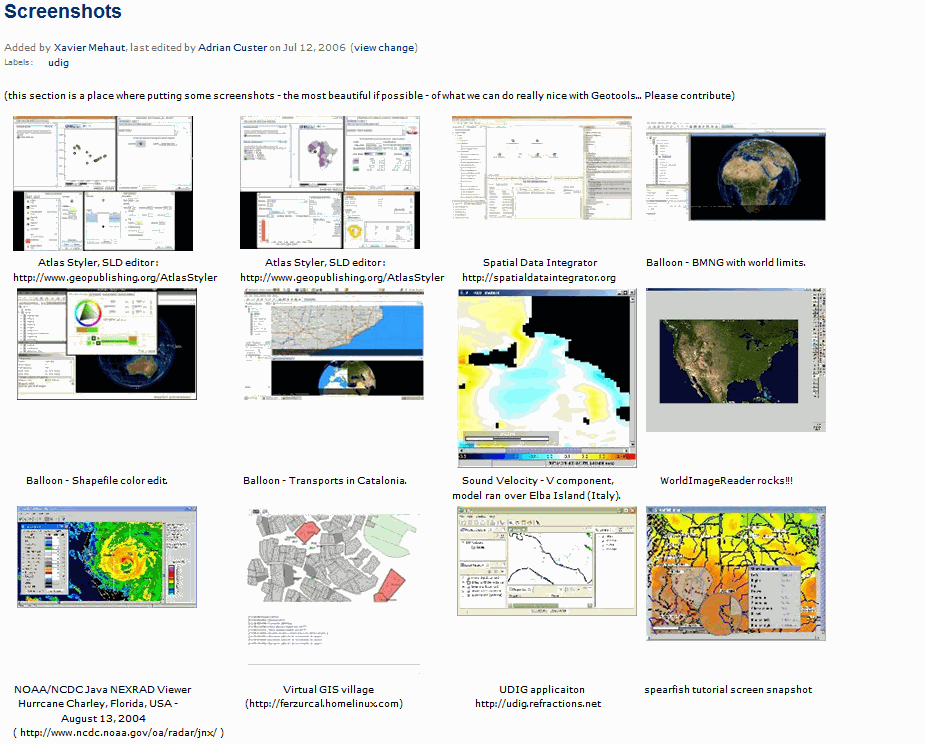geotools等值线生成
目录
概述
前文中,提到了等值面的生成,后面有人经常会问等值线的生成,本文在前文的基础上做了一点修改,完成了等值线的geotools生成。
效果


实现代码
package com.lzugis.geotools;
import com.amazonaws.util.json.JSONObject;
import com.lzugis.CommonMethod;
import com.lzugis.geotools.utils.FeaureUtil;
import com.lzugis.geotools.utils.GeoJSONUtil;
import com.vividsolutions.jts.geom.Geometry;
import org.geotools.data.FeatureSource;
import org.geotools.data.shapefile.ShapefileDataStore;
import org.geotools.data.simple.SimpleFeatureCollection;
import org.geotools.data.simple.SimpleFeatureSource;
import org.geotools.feature.FeatureCollection;
import org.geotools.feature.FeatureIterator;
import org.geotools.geojson.feature.FeatureJSON;
import org.opengis.feature.Feature;
import org.opengis.feature.simple.SimpleFeature;
import wContour.Contour;
import wContour.Global.Border;
import wContour.Global.PointD;
import wContour.Global.PolyLine;
import wContour.Global.Polygon;
import wContour.Interpolate;
import java.io.File;
import java.io.StringWriter;
import java.nio.charset.Charset;
import java.util.*;
/**
* Created by admin on 2017/8/29.
*/
public class EquiSurfaceLine {
private static String rootPath = System.getProperty("user.dir");
/**
* 生成等值面
*
* @param trainData 训练数据
* @param dataInterval 数据间隔
* @param size 大小,宽,高
* @param boundryFile 四至
* @param isclip 是否裁剪
* @return
*/
public String calEquiSurface(double[][] trainData,
double[] dataInterval,
int[] size,
String boundryFile,
boolean isclip) {
String geojsonline = "";
try {
double _undefData = -9999.0;
SimpleFeatureCollection polylineCollection = null;
List<PolyLine> cPolylineList = new ArrayList<PolyLine>();
List<Polygon> cPolygonList = new ArrayList<Polygon>();
int width = size[0],
height = size[1];
double[] _X = new double[width];
double[] _Y = new double[height];
File file = new File(boundryFile);
ShapefileDataStore shpDataStore = null;
shpDataStore = new ShapefileDataStore(file.toURL());
//设置编码
Charset charset = Charset.forName("GBK");
shpDataStore.setCharset(charset);
String typeName = shpDataStore.getTypeNames()[0];
SimpleFeatureSource featureSource = null;
featureSource = shpDataStore.getFeatureSource(typeName);
SimpleFeatureCollection fc = featureSource.getFeatures();
double minX = fc.getBounds().getMinX();
double minY = fc.getBounds().getMinY();
double maxX = fc.getBounds().getMaxX();
double maxY = fc.getBounds().getMaxY();
Interpolate.CreateGridXY_Num(minX, minY, maxX, maxY, _X, _Y);
double[][] _gridData = new double[width][height];
int nc = dataInterval.length;
_gridData = Interpolate.Interpolation_IDW_Neighbor(trainData,
_X, _Y, 12, _undefData);// IDW插值
int[][] S1 = new int[_gridData.length][_gridData[0].length];
/**
* double[][] S0,
* double[] X,
* double[] Y,
* int[][] S1,
* double undefData
*/
List<Border> _borders = Contour.tracingBorders(_gridData, _X, _Y,
S1, _undefData);
/**
* double[][] S0,
* double[] X,
* double[] Y,
* int nc,
* double[] contour,
* double undefData,
* List<Border> borders,
* int[][] S1
*/
cPolylineList = Contour.tracingContourLines(_gridData, _X, _Y, nc,
dataInterval, _undefData, _borders, S1);// 生成等值线
cPolylineList = Contour.smoothLines(cPolylineList);// 平滑
geojsonline = getPolylineGeoJson(cPolylineList);
if (isclip) {
polylineCollection = GeoJSONUtil.readGeoJsonByString(geojsonline);
FeatureSource dc = clipFeatureCollection(fc, polylineCollection);
geojsonline = getPolylineGeoJson(dc.getFeatures());
}
} catch (Exception e) {
e.printStackTrace();
}
return geojsonline;
}
public String getPolylineGeoJson(FeatureCollection fc) {
FeatureJSON fjson = new FeatureJSON();
StringBuffer sb = new StringBuffer();
try {
sb.append("{\"type\": \"FeatureCollection\",\"features\": ");
FeatureIterator itertor = fc.features();
List<String> list = new ArrayList<String>();
while (itertor.hasNext()) {
SimpleFeature feature = (SimpleFeature) itertor.next();
StringWriter writer = new StringWriter();
fjson.writeFeature(feature, writer);
list.add(writer.toString());
}
itertor.close();
sb.append(list.toString());
sb.append("}");
} catch (Exception e) {
e.printStackTrace();
}
return sb.toString();
}
public FeatureSource clipFeatureCollection(FeatureCollection fc,
SimpleFeatureCollection gs) {
FeatureSource cs = null;
try {
List<Map<String, Object>> values = new ArrayList<Map<String, Object>>();
FeatureIterator contourFeatureIterator = gs.features();
FeatureIterator dataFeatureIterator = fc.features();
while (dataFeatureIterator.hasNext()) {
Feature dataFeature = dataFeatureIterator.next();
Geometry dataGeometry = (Geometry) dataFeature.getProperty(
"the_geom").getValue();
while (contourFeatureIterator.hasNext()) {
Feature contourFeature = contourFeatureIterator.next();
Geometry contourGeometry = (Geometry) contourFeature
.getProperty("geometry").getValue();
double v = (Double) contourFeature.getProperty("value")
.getValue();
if (dataGeometry.intersects(contourGeometry)) {
Geometry geo = dataGeometry
.intersection(contourGeometry);
Map<String, Object> map = new HashMap<String, Object>();
map.put("the_geom", geo);
map.put("value", v);
values.add(map);
}
}
}
contourFeatureIterator.close();
dataFeatureIterator.close();
SimpleFeatureCollection sc = FeaureUtil
.creatSimpleFeatureByFeilds(
"polygons",
"crs:4326,the_geom:LineString,value:double",
values);
cs = FeaureUtil.creatFeatureSourceByCollection(sc);
} catch (Exception e) {
e.printStackTrace();
return cs;
}
return cs;
}
public String getPolylineGeoJson(List<PolyLine> cPolylineList) {
String geo = null;
String geometry = " { \"type\":\"Feature\",\"geometry\":";
String properties = ",\"properties\":{ \"value\":";
String head = "{\"type\": \"FeatureCollection\"," + "\"features\": [";
String end = " ] }";
if (cPolylineList == null || cPolylineList.size() == 0) {
return null;
}
try {
for (PolyLine pPolyline : cPolylineList) {
List<Object> ptsTotal = new ArrayList<Object>();
for (PointD ptD : pPolyline.PointList) {
List<Double> pt = new ArrayList<Double>();
pt.add(ptD.X);
pt.add(ptD.Y);
ptsTotal.add(pt);
}
JSONObject js = new JSONObject();
js.put("type", "LineString");
js.put("coordinates", ptsTotal);
geo = geometry + js.toString() + properties + pPolyline.Value + "} }" + "," + geo;
}
if (geo.contains(",")) {
geo = geo.substring(0, geo.lastIndexOf(","));
}
geo = head + geo + end;
} catch (Exception e) {
e.printStackTrace();
return geo;
}
return geo;
}
public static void main(String[] args) {
long start = System.currentTimeMillis();
EquiSurfaceLine equiSurface = new EquiSurfaceLine();
CommonMethod cm = new CommonMethod();
double[] bounds = {110.759, 31.23, 113.112, 32.6299};
double[][] trainData = new double[3][100];
for (int i = 0; i < 100; i++) {
double x = bounds[0] + new Random().nextDouble() * (bounds[2] - bounds[0]),
y = bounds[1] + new Random().nextDouble() * (bounds[3] - bounds[1]),
v = 0 + new Random().nextDouble() * (45 - 0);
trainData[0][i] = x;
trainData[1][i] = y;
trainData[2][i] = v;
}
double[] dataInterval = new double[]{20, 25, 30, 35, 40, 45};
String boundryFile = rootPath + "/data/shp/XY_01_XZQH_PY.shp";
int[] size = new int[]{100, 100};
boolean isclip = true;
try {
String strJson = equiSurface.calEquiSurface(trainData, dataInterval, size, boundryFile, isclip);
String strFile = rootPath + "/out/XY_01_XZQH_PY_line1.geojson";
cm.append2File(strFile, strJson);
System.out.println(strFile + "差值成功, 共耗时" + (System.currentTimeMillis() - start) + "ms");
} catch (Exception e) {
e.printStackTrace();
}
}
}技术博客
CSDN:http://blog.csdn.NET/gisshixisheng
在线教程
https://edu.csdn.net/course/detail/799
https://edu.csdn.net/course/detail/7471
联系方式
| 类型 | 内容 |
|---|---|
| 1004740957 | |
| 公众号 | lzugis15 |
| niujp08@qq.com | |
| webgis群 | 452117357 |
| Android群 | 337469080 |
| GIS数据可视化群 | 458292378 |
“GIS讲堂”知识星球今天开通了,在星球,我将提供一对一的问答服务,你问我答,期待与你相见。


转载自:https://blog.csdn.net/GISShiXiSheng/article/details/80556441



